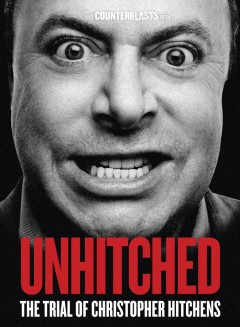 When my brother was at secondary school doing his A levels, he was given such stinking references by his teachers that one university interviewed him because they had to see this lad for themselves. I have rarely seen a book so roundly pilloried by reviewers as Richard Seymour’s Unhitched, the Trial of Christopher Hitchens, and so curiosity forced me to read it.
When my brother was at secondary school doing his A levels, he was given such stinking references by his teachers that one university interviewed him because they had to see this lad for themselves. I have rarely seen a book so roundly pilloried by reviewers as Richard Seymour’s Unhitched, the Trial of Christopher Hitchens, and so curiosity forced me to read it.
I can see why it got bad reviews. It is impudent to trash the reputation of a well loved journalist while he is still warm in his coffin. And Richard’s style is not everyone’s cup of lapsang souchong.
But let me share a secret – book reviewers rarely read a whole book, they sample the first chapter, and skim the rest.
The strong part of Seymour’s book is the last half, (and so probably unread by most reviewers): the thorough trashing he gives to Hitchens over his lamentably ignorant and frankly embarrassing writings about religion; and the verbal crucifixion of the Hitch over his prostration to American power in the Iraq war. Particularly skillful is Seymour’s turning the knife, when discussing the betrayal by Hitchens of his friendship with Edward Said, and how once Hitchens adopted his gushing enthusiasm for the American military, other key parts of his political identity, such as support for the Palestinians or his contempt for social inequality became unclaimed baggage.
This book has been unpopular among the cheerleaders for “humanitarian intervention” who welcomed Hitchens’s apostasy. Seymour makes a convincing case that for the last ten years of his life there was no aspect of Hitchens that was remotely left wing, or even liberal in the British sense, and he had become a vain self-caricature.
The trouble is that the gloriously enjoyable 50 pages where the indignant author eviscerates the bloated leviathan of HItchens does not make a book. Where Richard is on more unsure ground is in stretching it out by seeking to locate the origin of Hitchens’s later politics in seeds of earlier weakness. This particularly exposes Richard’s own rather brittle appreciation of national sensibility; it is unconvincing that Hitchens’s regard for Orwell’s sense of Englishness, and his comfortableness with being that certain type of Englishman who likes Kipling was a scratch that led to the gangrene of supporting Operation Desert Storm.
I was also amused at the irony that while Seymour was kicking Hitchens for his puerile and over-confident arguments against religion, he himself includes an undergraduate swipe at the philosophical school of scientific realism, founded on GCSE science blunders.
On the issue of Richard Seymour’s style, he is certainly keen on the long words; and as someone once said about Will Self, he knows the exact word for every occasion, as you find out when you have to look it up in the dictionary. Some of this is playfulness from Seymour, but some of it seems to be a sort of political cringe: when referring to Hitchens being workerist, Seymour translates it into French, seemingly to make terminology from his own Leninist past more acceptable to the literary salon. The suspicion persists that Seymour would rather like to be Christopher Hitchens. It is notable that the more annoying incidents of linguistic elevation are in the weaker parts of the book, when Richard has something meaty to say, he just says it. This suggests to me that he could benefit from a firmer editor.
The subtitle of the book “The Trial of Christopher Hitchens” echoes the book by Hitchens about Henry KIssinger; and Seymour argues that Kissinger became the symbolic limit for Hitchens, where he could self-justify reneging on his own radical past as long as he never reached the limit of apologizing for Kissinger. Perhaps this book serves the same purpose for Richard Seymour, clearly currently undergoing some reevaluation of his politics, that Christopher Hitchens is the man he is warning himself against becoming. I think this may be a key transitional book for Richard Seymour, as he more assuredly finds his voice as a writer of real promise: next time let us hope he picks on a subject more worthy of his talent.












